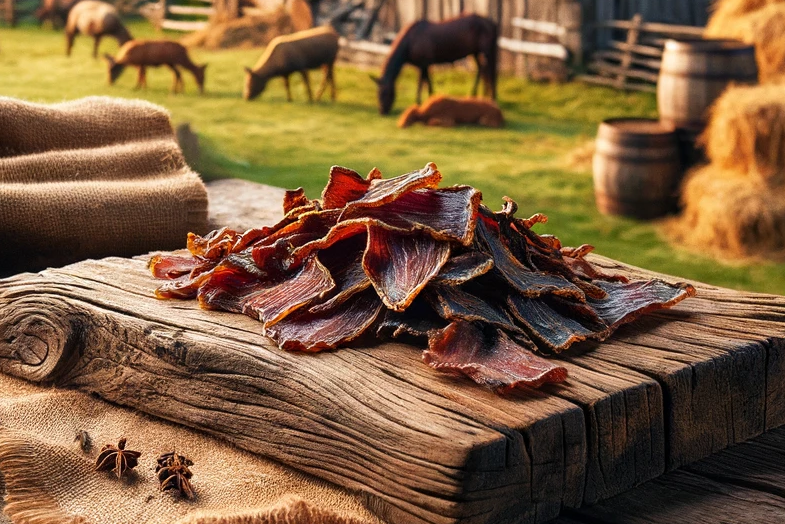Goat dried meat
What is dried goat meat?
In simple terms, dried goat meat is dried meat from goats. The drying process removes much of the water content from the meat, resulting in an easily digestible, nutrient-rich snack. This process naturally preserves the meat by inhibiting the development of microorganisms responsible for spoilage.
Benefits of dried goat meat for dogs
Goat jerky offers a number of benefits that make it an attractive addition to a dog's diet.
High nutritional value
Goat meat is known for its high protein content and a favorable ratio of essential amino acids. It is also rich in iron, zinc and vitamins B12 and B6, which help to support important bodily functions.
Hypoallergenic
Goat meat is considered hypoallergenic, which means that it is less likely than other meats to trigger allergic reactions in dogs. This makes goat jerky a good choice for dogs with food allergies or intolerances.
Good digestibility
The easy digestibility of dried goat meat can be particularly beneficial for older dogs or those with sensitive gastrointestinal tracts. The drying process preserves the nutrients, while the meat is easy for the dog to chew and digest.
Disadvantages and risks
Despite its benefits, there are some considerations that should be taken into account before introducing dried goat meat into a dog's diet.
Calorie content
As with all dried meat products, dried goat meat is high in calories. Excessive feeding can therefore lead to obesity, especially in dogs that are prone to inactivity or are already overweight.
Quality and origin
The quality of dried goat meat can vary, depending on the origin of the meat and the drying process. Products of dubious quality may contain harmful substances that could harm the dog. It is important to purchase dried goat meat from trustworthy sources.
Bone fragments
During the drying process of meat that contains bones, sharp bone fragments can form that pose a danger to the dog. It is advisable to choose dried goat meat that is free from bones and other hard components.
A tasty but thoughtful treat
Goat jerky can be a nutritious and tasty addition to your dog's diet, especially when offered in moderation as part of a balanced diet. Its hypoallergenic and highly digestible properties make it an excellent option for many dogs, including those with sensitive digestive systems or food allergies. However, it is important to consider the quality of the product and adjust portion sizes to avoid excessive calorie intake.
If you notice any signs of hypersensitivity or poisoning in your dog, you should see your vet immediately. We are not a substitute for a vet, but we try to be as accurate as possible. Every dog reacts differently and we recommend you get a second opinion or consult your vet if in doubt.
Stay healthy and take good care of your four-legged friend!😊
Similar to Goat dried meat
In simple terms, lamb jerky is dried meat from lamb. The drying process removes much of the water content from the meat, resulting in a long-lasting, energy-rich and tasty snack. This process is one...
Horse jerky is a natural snack for dogs that is produced by drying horse meat. This process removes moisture and preserves the meat naturally, making it longer lasting and easily digestible. It is...
What is beef jerky? Beef jerky is a type of dried meat that is made from beef. The meat is cut into thin slices and dried at a low temperature. The drying process causes the meat to lose most of its...
Venison jerky is made from the meat of wild animals such as deer, elk or wild boar. The dehydration process, in which the meat is slowly dried at a low temperature, removes moisture from the meat,...



